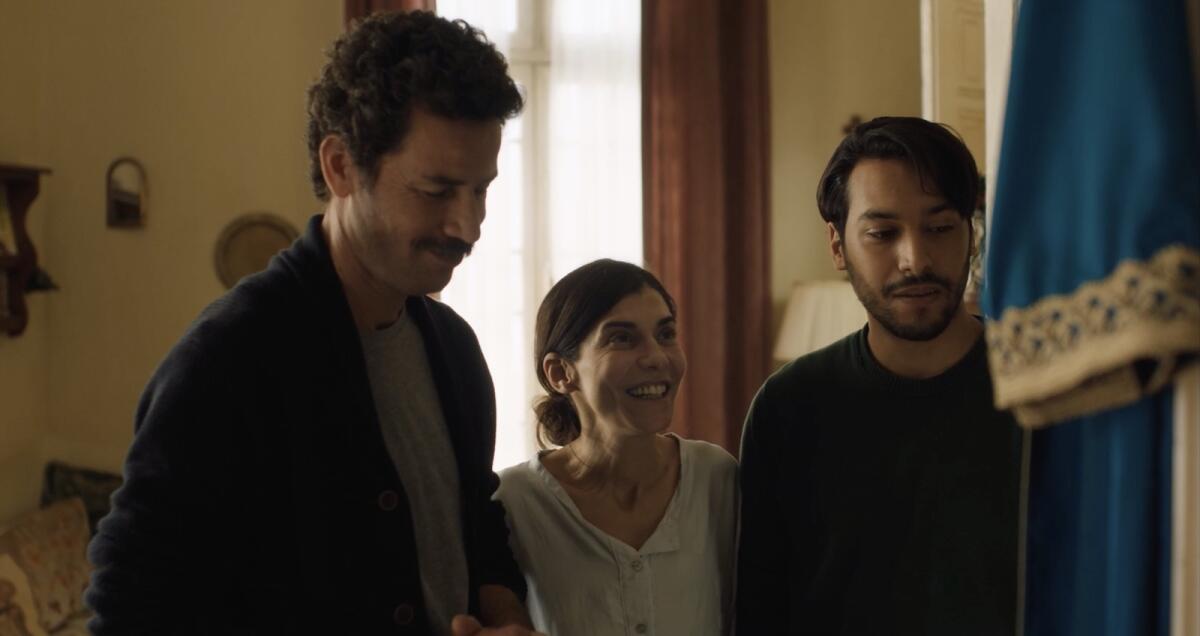Review: A tale of mature romance, ‘The Blue Caftan’ explores true love

- Share via
Mining sensuality from the depiction of involved handcraft, writer-director Maryam Touzani makes elegant human dramas embedded within traditional trades.
Touzani’s 2019 debut, “Adam,” centered on the sorority between a seasoned baker and a pregnant young woman with gastronomical abilities. Her latest delicacy, “The Blue Caftan,” Morocco’s shortlisted Oscar entry, traces the romantic entanglement that Halim (Saleh Bakri), a master embroiderer with a bashful personality but alluring blue eyes, and his dominant, yet sickly wife Mina (Lubna Azabal) enter of mutually unspoken accord.
For your safety
The Times is committed to reviewing theatrical film releases during the COVID-19 pandemic. Because moviegoing carries risks during this time, we remind readers to follow health and safety guidelines as outlined by the CDC and local health officials.
Since Mina’s illness has delayed their already slow production pipeline of made-to-order caftans — Halim refuses to use sewing machines — and clients have started complaining, the longtime couple hires Youssef (Ayoub Missioui), an industrious gay man, as an apprentice to help speed the fabrication process. Besides serving as the recipient of knowledge about a dying skill, his presence comes not as a threat but a blessing to their marriage.
Unhurried in its pace, “The Blue Caftan” dwells in the myriad of small gestures on which Halim and Mina’s relationship is forged: the boisterous laughs they share over the simplest of things, spontaneous outings, and his attentiveness to Mina’s comfort as her health decays. As intricate as the patterns Halim meticulously stitches onto his one-of-a-kind garments, the affection that guides their tried-and-true bond has transcended facile labels.
With a third person joining, their marital dynamic evolves. Aware of her terminal condition and of Halim’s attraction to Youssef, Mina turns jealousy into gratitude. Azabal, a superb actress who also starred in Touzani’s “Adam,” manifests an inner strength and feisty cheekiness that contrast with Bakri’s tranquil demeanor, effectively convincing us their characters complement each other. There’s a lived-in quality to their mundane exchanges.
For a long time, Halim found relief for his suppressed sexual desires in the secrecy of a nearby bathhouse. His and Youssef’s burgeoning connection presents homosexuality not as a sordid lifestyle but fertile ground for intimacy as meaningful as that of heterosexual matrimony. That stands as an ideologically powerful statement, even more so in a film set and made in a predominantly Muslim country where the topic remains taboo.
Underlying the film’s emotional concerns is the creation of the dazzling caftans. Over the course of the story, the focus of Halim’s laborious artistry is a blue satin garment with golden embellishments (petroleum blue, specifically, as Halim notes to an imprudent patron). Even after there is no longer a pressing due date, he is bent on finishing the piece. Touzani places little importance on grand plot revelations, but instead uses imagery of meticulous material creation to visually symbolize enduring and hard-fought beauty.
An exquisitely tender tribute to love in its purest expression, “The Blue Caftan” doesn’t romanticize the complications and conflicts facing its two soulmates, and precisely because of that it feels like an utterly honest tale of romance. Softhearted rather than sultry, love like theirs takes its time to mature and become comfortable with both each other’s gifts and shortcomings. There might be few greater demonstrations of selfless adoration than Mina’s wish to protect her beloved from the loneliness of her imminent departure from this world.
Although we can infer what the final fate of the titular garment will be, that doesn’t take away from how it underscores the defiance and conviction of two people —and eventually three — to live and die faithful to their own true colors.
‘The Blue Caftan’
In Arabic with English subtitles
Not Rated
Running time: 2 hours, 2 minutes
Playing: Laemmle Royal, West Los Angeles
More to Read
Only good movies
Get the Indie Focus newsletter, Mark Olsen's weekly guide to the world of cinema.
You may occasionally receive promotional content from the Los Angeles Times.










